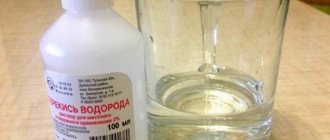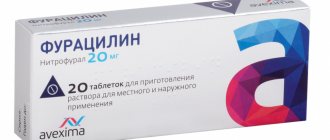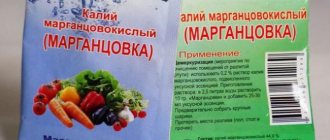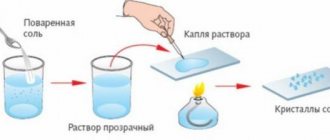Hydrogen peroxide is a substance that modern people always have at hand, because it is used in medicine and in everyday life, in clinics and at home. Recently, many useful tips have appeared on the use of this drug for rinsing the mouth for the purpose of disinfection, gum treatment and teeth whitening. But any medicine has contraindications and negative effects , so first you should figure out whether it is possible to rinse your mouth with hydrogen peroxide and how it should be diluted.
Is it possible to rinse teeth and gums with hydrogen peroxide?
You can rinse your mouth with hydrogen peroxide without harm to your teeth and body, but only with a solution with a concentration of no more than 3%. When rinsing your mouth with this liquid, several effects occur simultaneously:
Disinfection of the oral cavity.- Acceleration of healing of wounds and inflamed mucous membranes.
- Drying of the mucous membrane.
- Enamel whitening.
- Stopping minor bleeding.
- Cleansing the oral cavity from crusts, scabs, remnants of blood clots after injuries and operations.
This complex effect has led to the widespread use of this product in dentistry. Dentists prescribe peroxide rinses for the following conditions:
- Oral infections – stomatitis, candidiasis.
- Inflammatory processes - gingivitis, periodontitis, periodontal disease.
- Bleeding gums.
- Presence of dark spots on the enamel.
- The presence of bad breath is halitosis.
The product is used in the treatment of sore throat, otitis media and runny nose, as well as when lips become inflamed due to herpes. To do this, take a diluted solution, but it can only be used after consultation with the attending physician.
Cautions when rinsing teeth with hydrogen peroxide
To many, hydrogen peroxide seems like the most harmless antiseptic, but it has many contraindications and requires caution when used. The drug should not be used:
- For severe bleeding gums in patients with periodontitis.
- If there are a large number of fillings.
- Patients with a thin layer of enamel and caries.
- During pregnancy and lactation, due to the possible consequences of rinsing the mouth with hydrogen peroxide, not only for the mother, but also for the baby.
- For the treatment of children under 12 years of age. Children may rinse incorrectly and swallow the product. In addition, they are more sensitive to the unpleasant taste of the drug, which may cause them to vomit.
- During antibiotic treatment.
Hydrogen peroxide should not be taken orally. A solution with a concentration of more than 3% should not be used even for rinsing the mouth; it should be diluted.
Hydrogen peroxide must not only be used correctly, but also stored with precautions. A bottle of peroxide solution, perhydrol or hydroperite tablets - other pharmacological forms of this drug - should not be left in places accessible to children. Poisoning with this drug can be fatal. It is better to store the drug in a closed cabinet in a room where there is no strong increase in air temperature, otherwise it will lose its properties.
Use of the product during pregnancy
During pregnancy, it can be used as prescribed by a doctor. Since this drug does not have many side effects and does not have a negative effect on the fetus.
But during pregnancy, rinsing alone is not enough, since a viral or bacterial disease can be dangerous for the child. Therefore, rinsing is often combined with other methods of treatment:
- antibacterial therapy (antibiotics are selected taking into account the woman’s position);
- throat sprays (Miramistin);
- rinsing with a decoction of medicinal plants.
Despite the large number of modern medications, hydrogen peroxide is considered one of the most effective and safe drugs.
The minimal number of side effects makes it the most preferred treatment option for children and pregnant women. In addition, the main advantage is the low price of the drug.
How to properly prepare the solution and rinse your mouth
Before you rinse your mouth with hydrogen peroxide, you need to dilute it. It is recommended to take a tablespoon of hydrogen peroxide per glass of water. The solution should not be hot, but not cold either. Rinsing begins only after thoroughly brushing your teeth and rinsing the mouth with clean water; such manipulations will prevent unwanted chemical reactions between the components of the drug and the toothpaste.
The peroxide solution should not be kept in the mouth for too long; it is recommended to carry out the procedure for no longer than 10 minutes. During this time, you should periodically spit out the liquid and put a fresh portion into your mouth. After the procedure is completed, the product is spat out so that it does not remain in the mouth or enter the digestive system.
If the rules of rinsing are violated, nausea and vomiting may occur; in severe cases, burns of the digestive organs may occur. If you feel a strong burning sensation during the procedure, especially if there are ulcers on the oral mucosa, you should stop rinsing and rinse your mouth with clean water.
How to carry out the procedure?
To prepare a solution for mouth rinsing, you need to purchase a 3% solution of hydrogen peroxide and dilute it with clean, warm boiled water in the proportion of 15 drops of peroxide per 100 ml of water. If hydroperite is to be used, 1 tablet is dissolved in a glass of water.
The essence of the procedure is very simple - you need to take the solution into your mouth and rinse your mouth for a couple of minutes . The liquid is then spat out and collected again. Each time for the procedure, you should prepare a fresh portion of the solution - you cannot store the prepared solution.
As mentioned earlier, to relieve the unpleasant aftertaste, it is recommended to rinse your mouth with clean water at the end of the procedure. To consolidate the positive effect, you can rinse your mouth after peroxide with a decoction of medicinal herbs - chamomile, sage or mint.
It is recommended to rinse with peroxide several times a day . As for the course of therapy, it depends on the cause of bad breath. For example, for stomatitis or periodontitis, the course of treatment is a week.
If the cause of the unkempt odor is aphthous stomatitis, it is better not to rinse your mouth with peroxide, but to soak cotton pads in it and apply them to the affected areas for 1 minute. This procedure should also be carried out several times a day. You need to rinse your mouth more than half an hour before meals.
If, when rinsing, unpleasant sensations are observed - itching or burning, the procedure should be stopped immediately , and the oral cavity should be thoroughly rinsed with water. If peroxide has caused severe irritation of the mucous membranes, it is recommended to rinse your mouth with infusion of chamomile.
Experts advise avoiding the consumption of acidic and alkaline foods during treatment. You should also refrain from drinking alcohol and coffee - these habits negatively affect the gums and mucous membranes, and also accelerate the development of inflammatory processes in the oral cavity.
There is another way to use hydrogen peroxide - massage your gums with peroxide and soda balls. The recipe is simple :
- a teaspoon of soda is mixed with 10 drops of a 3% peroxide solution;
- the mixture rolls into a hard ball;
- the ball is applied to the gums and a 10-15 minute massage is performed;
- The therapeutic course continues until the bad breath is completely eliminated.
Important! It is not advisable to use peroxide to rinse your mouth for a long time - it may dry out the mucous membranes and damage them.
We invite you to watch an informative video about rinsing the mouth with hydrogen peroxide:
Can peroxide be used to whiten teeth?
Hydrogen peroxide can be used to whiten tooth enamel only if there are no contraindications. To make sure that the enamel layer is strong enough and not too thin, it is better to visit a dentist and consult with him about the possibility of using this product.
The following whitening methods are known:
- They take a mixture of hydrogen peroxide and soda, sometimes diluted with eucalyptus oil. The paste is applied to a toothbrush. After brushing your teeth, you need to rinse your mouth. Food can be taken no earlier than 20 minutes after the procedure.
- Three drops of the product are placed on toothpaste; it is recommended to use toothpaste for the treatment of periodontal disease.
- If there is a limited stain on the enamel, you can clean it with a cotton swab dipped in hydrogen peroxide. But first you need to undergo an examination by a dentist so as not to provoke the destruction of the enamel.
- Instead of a pharmaceutical 3% solution, sometimes they take hydroperite tablets and dissolve them in clean water: 2 tablets per 100 ml.
Teeth before and after whitening with hydrogen peroxide
Rinsing your mouth with hydrogen peroxide to remove odor
Halitosis can be caused by many dental and internal diseases. Hydrogen peroxide helps get rid of unpleasant odor if the cause of its occurrence is related to the condition of the oral cavity. Rinsing the mouth with this product for gumboils, periodontal disease, stomatitis, and gingivitis helps eliminate pathogenic microflora from the surface of the oral mucosa. And along with it, the smell, which is a consequence of the vital activity of microbes, disappears.
If the cause of halitosis is diseases of the internal organs, hydrogen peroxide will not be able to effectively combat oral odor. Disturbances in the functioning of the kidneys and liver, diabetes mellitus provoke the appearance of various foreign odors from the mouth, even with an admixture of chemicals: acetone, ammonia. They also cannot be eliminated by rinsing; targeted complex treatment is necessary.
In case of dysbacteriosis or infectious inflammation of the ENT organs, which also cause a putrid odor in the mouth, peroxide, when used correctly, can reduce the intensity of the amber.
To rinse your mouth, hydrogen peroxide must be diluted with water (pre-boiled). You need to rinse your teeth and gums for a minute 1-3 times in a row, after which the mouth is rinsed with clean water. The procedures are done three times a day for 3–5 days.
What to do after rinsing
After gargling, be sure to irrigate your throat with plain boiled water at room temperature or a decoction of medicinal plants. This is necessary to soften the mucous membrane of the pharynx, as well as to remove residual peroxide.
You can use solutions of sea or table salt.
It is also not recommended to refrain from eating and drinking liquids for 1 hour after rinsing.
Pros and cons of using hydrogen peroxide to treat teeth and gums
Based on the available reviews and opinions of people who have used hydrogen peroxide solution for mouth rinsing, this product has the following advantages and disadvantages:
| Advantages | Flaws |
| Complex therapeutic effect, noticeable improvement in oral health. | Possible consequences if used incorrectly. |
| The safety of rinsing gums with hydrogen peroxide if the proportions are observed. | Unpleasant taste in the mouth during and after the procedure. |
| Availability in all pharmacies and low price. | Burning in the mouth when rinsing, especially in the presence of wounds. |
People who often rinse their teeth with this product recommend rinsing their mouth with an infusion of herbs with a pleasant smell after the procedure. This helps reduce the feeling of unpleasant taste and prevent the gag reflex. If you feel a burning sensation, you can dilute the solution to a lower concentration.
Hydrogen peroxide is a useful, widely available remedy that helps fight the symptoms of various dental inflammations. Therefore, it is often prescribed in dentistry and otolaryngology.
To dilute peroxide in the correct proportions in each specific case, an individual consultation with a clinic physician or dentist is advisable. After using the product for any purpose, rinse your mouth thoroughly with boiled water.
How to treat a throat with peroxide according to Neumyvakin
Professor Neumyvakin introduced many methods of drug treatment into practice.
Rinse according to Neumyvakin:
- 1-2 teaspoons of peroxide;
- ¼ cup boiled water.
Everything needs to be mixed and then gargled. During the rinsing process, you need to retain the solution in the tonsil area.
In addition to gargling, Neumyvakin, other methods of treatment were invented. For example, treatment of skin diseases or diseases of the mouth and gums.











